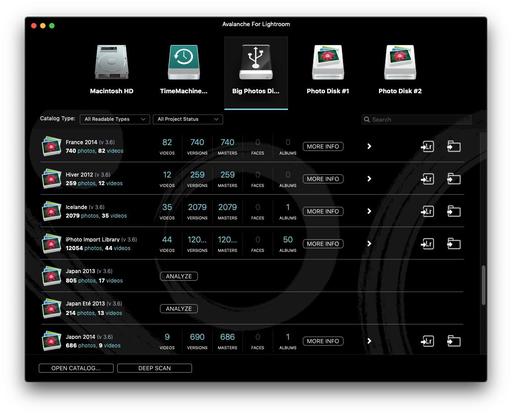If it's time to relocate your Aperture images to Lightroom, this new app might be just the solution that you've been waiting for.
Avalanche is designed to convert catalogs of photographs from one application to another while keeping the organizational structures intact, ensuring all metadata flows without losses, and that image adjustments are replicated with the best possible results.
Avalanche for Lightroom, the first version of Avalanche, focuses on providing a solution for photographers with photos stuck in Apple Aperture that isn't supported anymore by Apple. Since the release of Catalina, Aperture users can't rely on launching Aperture anymore to access their photo libraries. Avalanche allows a smooth transfer of the libraries towards other applications - today toward Lightroom or folders, and soon including other apps like Luminar and Capture One Pro.
"We designed Avalanche because we were not satisfied by the existing solutions to migrate our many photo catalogs out of Aperture." said Matthieu Kopp, CYME co-founder and CTO. "We realized that being able to switch our preferred cataloging/app was important as many great photo edition apps exist in this space. Being able to move all our images with metadata, organisation structure, and some edits was opening new perspectives and giving us a much wanted freedom of choice."
But Avalanche does not stop here. "We wanted to ensure that everything that was present in the source catalog was converted, even if it looked hard or impossible. Therefore Avalanche converts Faces and recreates them, not as keywords like other solutions do, but as real face detections in the destination catalog."
"Avalanche not only does a great job at opening and converting those catalogs, but we added some unique Machine Learning capabilities to transfer a number of adjustments. And when Avalanche estimates that a picture has adjustments that are too complex to migrate, it places the image in a dedicated album for the user to review after conversion."
Avalanche Features
- Browser interface to easily find all catalogs on all connected volumes.
- User friendly conversion screen with detailed information about the content to be converted and detailed progress monitoring.
- Detailed reporting screen and a conversion log in the form of a CSV file to easily find out what errors were encountered (missing files, corrupted database situations...
- Aperture Masters and Versions copies are fully converted into masters and virtual copies in Lightroom.
- Videos and video versions are fully converted into master videos and virtual copies in Lightroom.
- Albums: simple albums are recreated in the target catalog. Smart albums are not converted.
- Face definitions and face detections are fully converted in Lightroom.
- All customs annotations, flags, ratings, color labels are converted.
- Keywords are converted with full support for hierarchies.
- All IPTC and EXIF metadata is supported. Avalanche even harvests EXIF data from the master files to enrich the target catalog.
- Projects, Folders, Stacks are recreated in Lightroom.
- AI powered adjustments: WB temperature and tint, exposure, contrast, vibrancy, saturation, black and white levels, highlights and shadows are converted using Machine Learning (ML).
- Curves are converted.
- Images converted to black and white are properly migrated and ML is used to infer the proper color mix from color space to black and white.
- Conversion options letting you decide how to handle referenced files, videos, etc...
- The choice of folder hierarchy for the copied master files.
System Requirements
Avalanche for Lightroom requires macOS 10.14 or later and runs fine on Catalina. You'll need around 145 MB of free space, 4 GB of memory (8 GB is recommended) and enough space to accommodate the converted libraries. A working copy of Apple Aperture is NOT required to migrate Aperture libraries as Avalanche opens those libraries natively.
Visit the Avalanche home page for more information, trial version, or to purchase for $59.
You can share your thoughts at the TDS Facebook page, where I'll post this story for discussion.












